Mental Health and Travel: Tips on surviving the journey
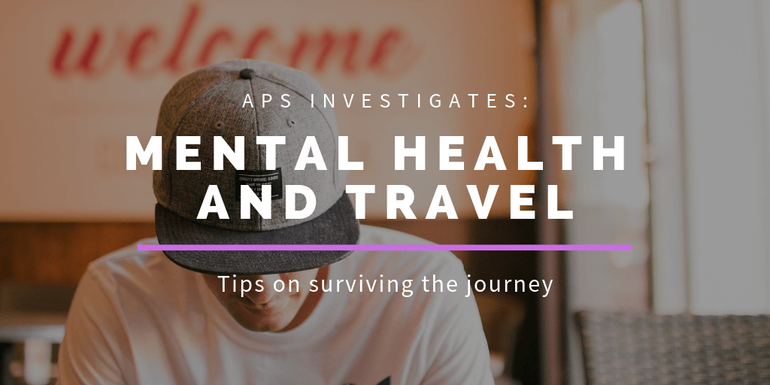
Mental Health. A subject that for many is difficult to talk about, understand or even relate to. For years, mental health conditions have been seen as taboo, but luckily this is slowly becoming a thing of the past. This is thanks to initiatives such as Heads Together, a campaign backed by the Duke and Duchess of Cambridge, alongside Prince Harry, to end the stigma around discussing mental health and illness.
You’ll know from our past blogs that we have covered topics on travelling with hidden disabilities such as autism and dementia. So we thought it was about time we looked into travelling with mental health issues too, because let’s face it, it’s got to be just as challenging, right?
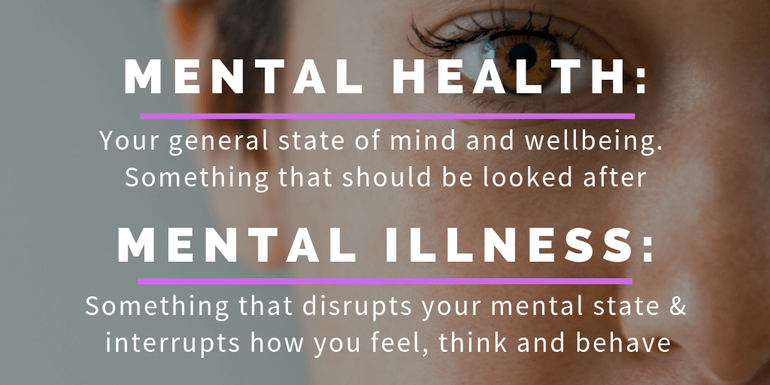
Why we chose to investigate mental health and travel
Back in January 2017, we sent a survey out across social media with a range of questions designed to give us an idea of what travelling was like and what issues may be faced by those battling with their mental health, their family members or carers alike. The answers sometimes shocked us and broke our hearts, but we were equally warmed by the sense of community and the openness and honesty of everyone that took part.
Who took our Mental Health and Travel survey?
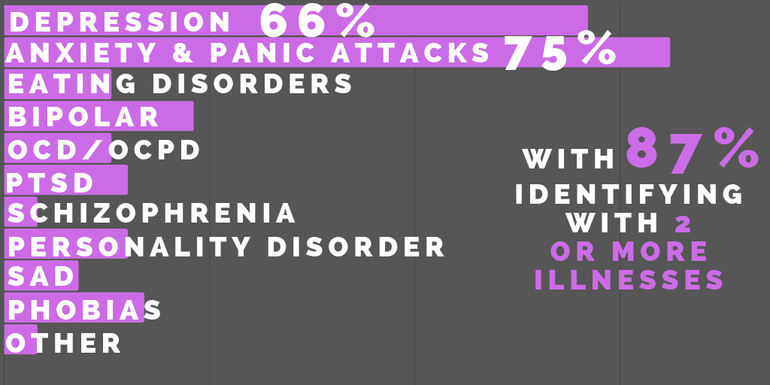

It was interesting to see how many identified with being affected by more than one illness, too. Something that maybe isn’t always taken into consideration by those who don’t have an illness. For instance, an eating disorder may also trigger anxiety and OCD.
So what did we ask and find out? Below we have summarised each of the questions we put to our respondents; how much of this can you relate to? Or have you ever considered that a fellow passenger could be facing these situations?
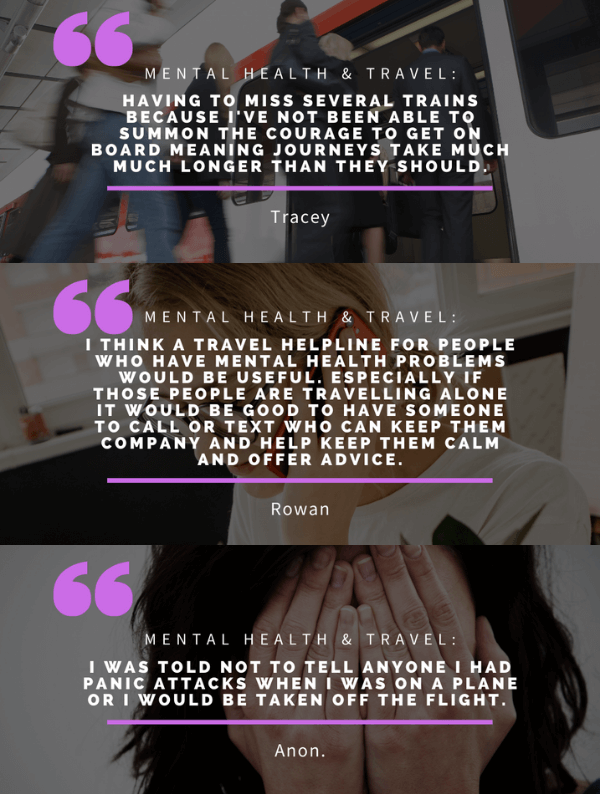
“Has your mental health
ever stopped you travelling?”
A huge 76% responded Yes to the above question, with plenty of explanations as to why. Alongside those mentioned in our graphic below, reasons included feeling too overwhelmed, it causes too much stress, public places are too dirty and people don’t care about those who don’t outwardly look like they “have something wrong with them”.
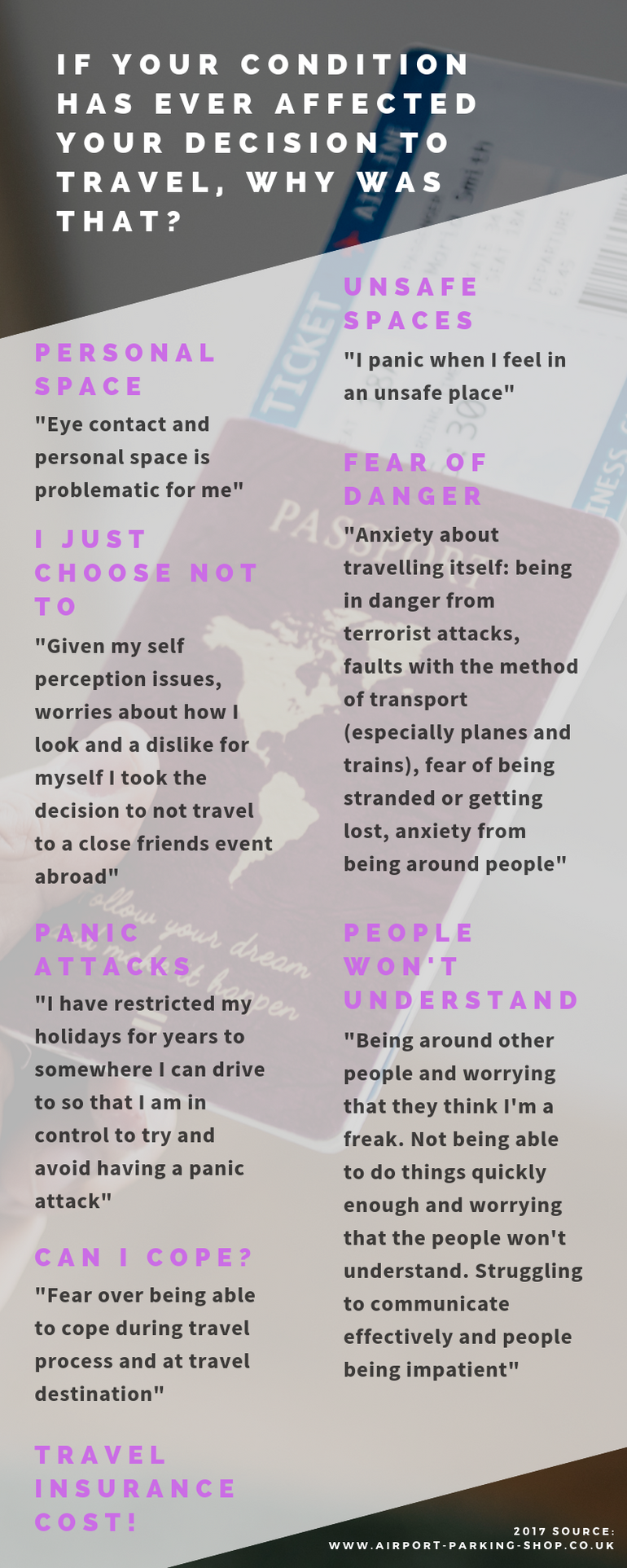
We then asked, “Do you think there is enough support in the tourism industry for those travelling with a mental illness?” to which the answer was a resounding No. Many stated that they felt mental health issues or illnesses weren’t seen as a ‘problem’ and therefore assistance isn’t offered in the same way it would for a person with an obvious, physical disability.
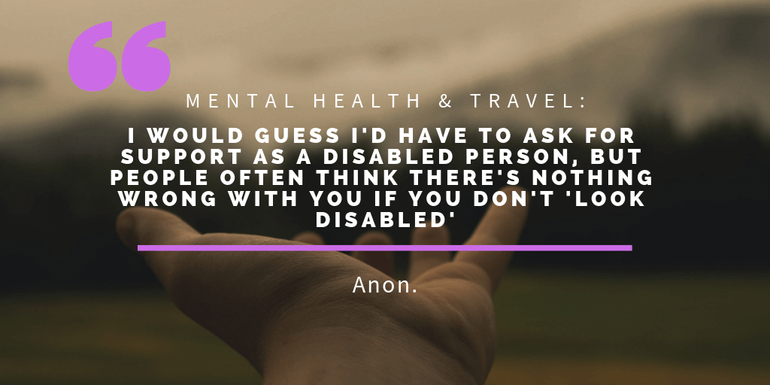
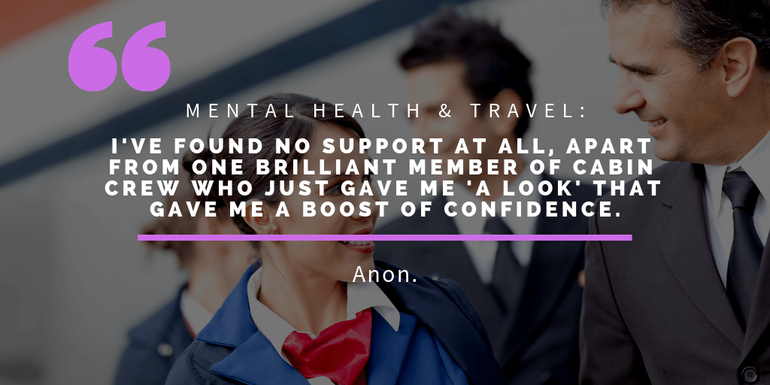
Several respondents picked up on just how stressful travelling can be, and many felt that this isn’t taken into consideration at security checks for example. Those with anxiety or bipolar for instance stated they may be perceived as acting “strangely”, leading to questioning by security staff, thus unfairly worsening their mental state.
Experiences when travelling with a mental health condition
Throughout this project, we have been lucky to work with representatives from several leading charities and organisations, who were more than happy to share their experiences of travelling with a mental health condition.
First up, we spoke to Jayne Hardy, Founder and CEO of the Blurt Foundation, a support organisation she set up after she lost the majority of her twenties to depression. Here she speaks about how her anxiety can hinder her travels.

Travelling with anxiety
In another example, Vice President Richard Monaghan from SeeMe Scotland gave us his account of what it’s like to travel with acute anxiety;
“Everything that triggers acute anxiety is covered by air travel; the busy airport, people swarming like ants heading in all directions and there’s no time to ask for help. Courtesy is out of the window, passengers hell bent on getting to a certain desk, or gate, interrupted by passport checks, security checks, gate checks…
Direction signs that merge into a yellow blur, arrival and departure boards clicking away, all this is a sensory nightmare and my brain is in overload, panic is now starting to set in, and still, there is no one I can see who could help me. If I tell them I am suffering from acute anxiety would they even understand?
Oh to be a child again and have someone guide me through this madness and confusion, to be able to pass the message on to the next link in the chain as I progress towards the plane, and if it happened when I land at the other end, the journey would be like any other – before I became ill – Richard Monaghan
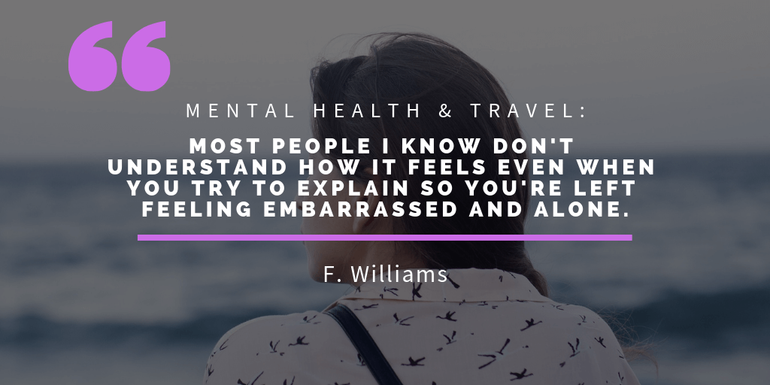
Travelling with an Eating Disorder
For a perspective on travelling with an eating disorder, Hope Virgo, mental health champion, told us how it feels and how travelling actually helped her overcome her condition;
Travel really can broaden the mind
Worrying about travel is normal. I know I certainly did. Sitting in the back of a car on the way to Heathrow Airport with a one-way ticket to Thailand, with no real plan, terrified me. This was the most spontaneous thing I had ever done, but when my boyfriend Will got a job teaching English in a village in Northern Thailand, I knew I had to risk it and go.
Arriving in Long with no hot water, geckos on the walls and a toilet that only flushed manually, I was already out of my comfort zone. What was I going to do about food? Calorie counting? Exercise? I was terrified. I was going to come back huge! But the reality was that actually there was something quite refreshing not having to think about food whilst I was away. Calorie counting was impossible.
Looking back, I realise that year massively helped my anorexia. Switching off from calorie counting was liberating, and although at times it was hard and scary, I did it. Don’t let having a mental illness stop you from travelling the world. It can be empowering, liberating and refreshing stepping away from the worries of normal day-to-day life. Push those boundaries and allow yourself some time to relax. I loved it. I learnt to love looking after myself and doing things I wanted to do. Living in London can, at times, be stressful, and you can easily get sucked into everyday pressures. So I guarantee that getting away helps./p>
It was that year whilst volunteering in a children’s centre that I realised I wanted to invest time in helping others. One way of doing this was to write a book – Stand Tall Little Girl – about my experiences of anorexia. I wanted my story to be used to empower others with mental health problems, proving that recovery is possible and that having a mental health problem doesn’t stop you doing things.- Hope Virgo
Mental Health and Travel: The experiences
No matter the situation or what condition the traveller is affected by, it’s clear that there are plenty of shared experiences. Here’s how several of our respondents described their experiences of travelling, in particular the airport journey itself.

Mental Health and Travel Insurance: How is that Affected?
Along with everything you might need to consider when you are travelling with a mental illness, there are other factors that were brought to our attention during this survey, and one of those was that of travel insurance. Insurance is something that everyone should have when they travel overseas, but as with having other pre-existing conditions, getting cover can come at a price.
You’ll usually be seen as “high risk” and so therefore companies are reluctant to cover you, or if they do, you have to foot a hefty premium. As you’ll see in the graphic above, one of our respondents stated that their original flight home was not covered by insurance when they needed to fly home sooner because mental health reasons aren’t considered an emergency.
Hardly seems fair, does it?
Stephen Buckley from Mind, had this to say on the matter:
“Having a mental health problem can make travelling challenging, especially abroad, but it shouldn’t stop somebody seeing the world.
We hear from people who have found it difficult to arrange insurance because of a pre-existing diagnosis for example, or from people who are unsure what kinds of medication they can take overseas with them.
Planning ahead can help overcome these challenges and make sure they enjoy their trip. The Foreign and Commonwealth Office (FCO) has a good guide about travelling abroad for people with mental health problems.” – Stephen Buckley
There’s still a way to go to overcome this issue in the travel insurance industry, but it’s definitely something that travellers should be aware of when looking to go away.
What more can be done to help people travelling with a mental health condition?
Many of the respondents said that training for transportation staff in general needed to be rolled out, and any available assistance should be made clearer to those who may require it.
Other suggestions included separate seating areas for those with anxiety disorders to keep them away from too much crowding, priority queues for security and boarding the plane, and making it easier to access help. As one respondent, Mary, pointed out, “There seems to be very little way of 1) making travel companies aware of a mental health problem 2) getting across the difficulties it can cause even if on the surface the customer ‘looks OK’“.
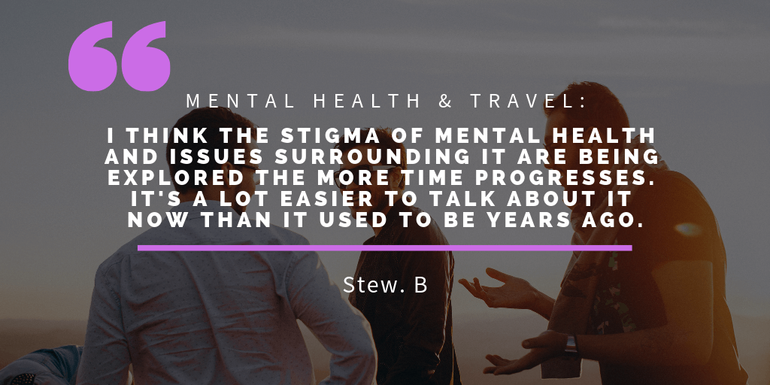
One anonymous account we received really struck a chord with us. Here they discuss what impact having depression, anxiety, an eating disorder and OCD/OCPD has had on their travel experiences and what may help others in a similar situation;
“The thought of travelling by myself (anywhere, even to the shops or town) made me anxious and nauseous to the point where I just wouldn’t leave. I was once denied access onto a train as I was panicking and couldn’t explain to the conductor what was going on and which train I needed to be on. Generally I have found that some attendants (airport, rail station etc) do understand and are willing to help, if I am able to briefly explain why I am struggling. Only on one occasion have I found someone who was unwilling to help. My tips for travelling? Try not to think about it and worry too much. There are so many people around (which is a scary prospect in itself, I know) but they are all getting on with their day and not focussing on you. Attendants are generally all lovely and should you need help with anything, just ask. Write some notes in a notebook such as “I’m panicking. I need you to count slowly with me until I get my breath back”, “It’s too crowded, I need somewhere quiet” etc. so if you’re anxious and can’t talk, you can still explain what’s happening and what you need.”
“Mental health is not a dirty word. We all have #mentalhealth like we do #physicalhealth, good or ill.” ~Prince Will… pic.twitter.com/KlIoYuGxjX
— Painted Brain (@ThePaintedBrain) February 11, 2017
Planning for your break abroad
Travelling abroad? There are plenty of websites with information on the things you should consider before travelling, should you decide to do so. Most notably, you should research your destination; what mental health support facilities and organisations are in the area? Could you contact them prior to arrival to book in to any sessions at all? Are you comfortable in a foreign country? If you’ll be travelling with a companion, perhaps ask them to help you with the planning should you find it daunting.
On the flip side, if planning activities in advance makes you anxious, perhaps just a collection of information that’s ready to hand would be useful. It may also act as a nice distraction from any worries you may have.
Here, Polly from Bridge Mental Health explains how you can prepare for a trip if you’re feeling nervous. Just click on the arrows to read more!
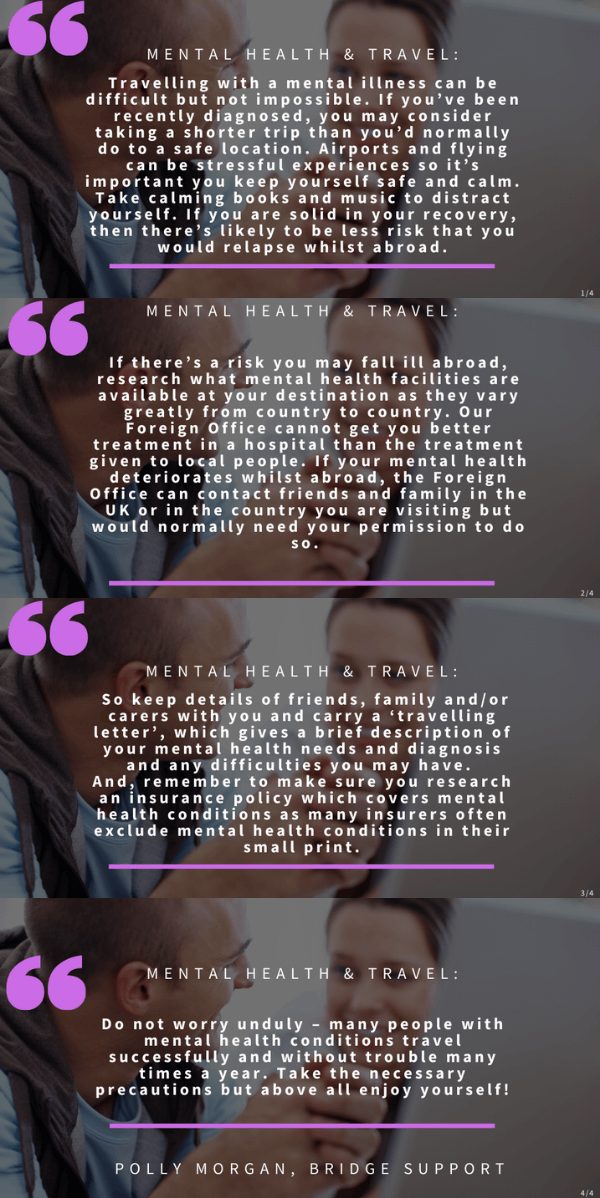
Planning for your trip can be made easier when the airports themselves get on board with the problems we’ve highlighted. Here is how Inspire are working closely with Belfast City Airport, as Peter McBride, Group Chief Executive explains:
“Mental health problems are regarded as one of the most common forms of illness and disability. We know that one in five people in Northern Ireland reported having mental health problems costing the local economy well over £3.5 billion per year.
As part of the partnership with Belfast City Airport, we are trying to find bright innovative ways to make people more aware of their mental health, and believe the mindfulness classes at the airport will do just that. People travel for a number of reasons and some find the journey itself stressful.
These classes are designed to reduce the stress of the journey by promoting positive wellbeing, offering tips for relaxation and building coping mechanisms.” – Peter McBride
Planning for your break in the UK
If staying in the UK, there are plenty of charities offering respite care, short trips and weeks away for those with mental health conditions, the cost of which can usually be subsidised by the charity.
Each charity will offer something different, so keep that in mind. For instance, Making Space offer breaks for those with schizophrenia, and Revitalise offer breaks for adults with learning difficulties with 24 hour subsidised care.
Mental Health charity Mind has a network of 140 local Minds across England and Wales, some of which offer group trips. Look up your nearest local Mind to find out more.
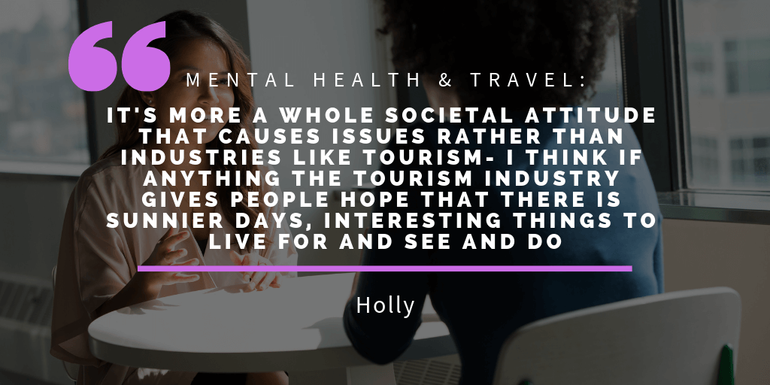
Tips for travelling with a mental health condition
Finally, we asked our respondents what piece of advice they would give someone else travelling with a mental illness to which we received an overwhelming response! A lot gave the same advice on planning and travelling with a companion, and also to have back up plans should things not quite pan out as you’d expected them to. Although there was a resounding message of taking a travel partner to make things easier, a few advised travelling alone to help you combat your own fears and make you stronger. Which do you agree with?
Each of these tips are direct responses to our question.
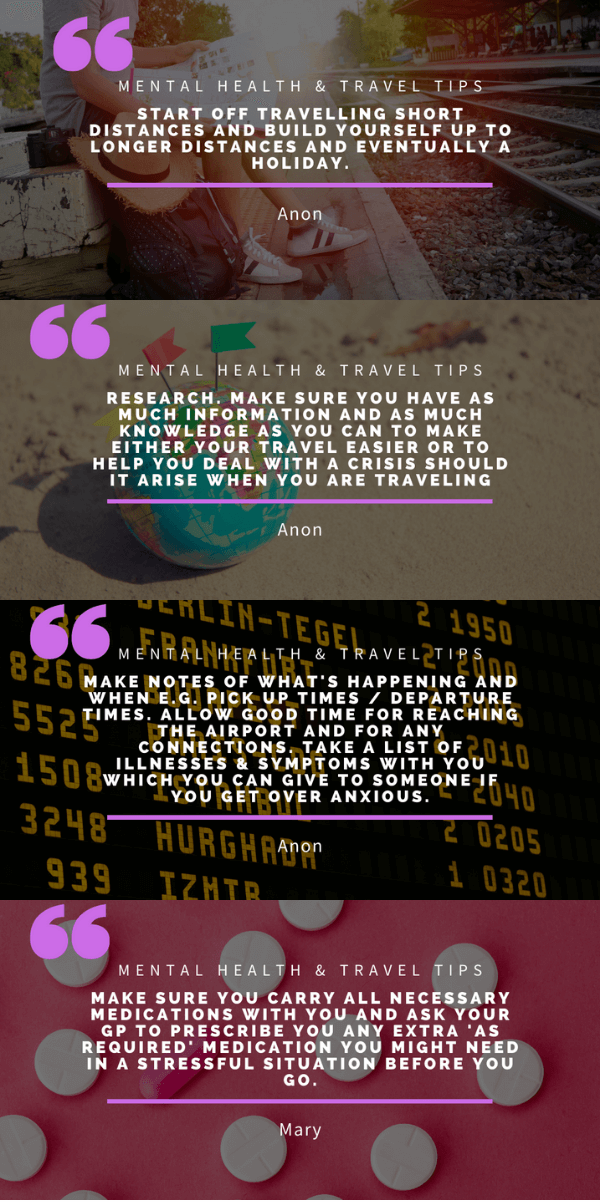
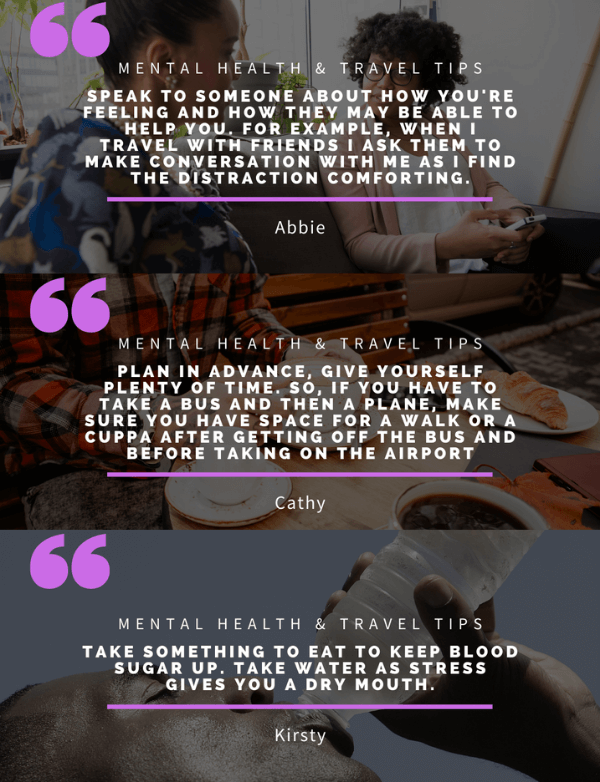
And our number one, top tip comes from Laura who has suffered from depression, anxiety and panic attacks in the past. She also has a fear of heights and crashing ever since an accident she was involved in. It’s more of a mantra than a tip, but it’s one that we feel a lot of travellers may find useful…
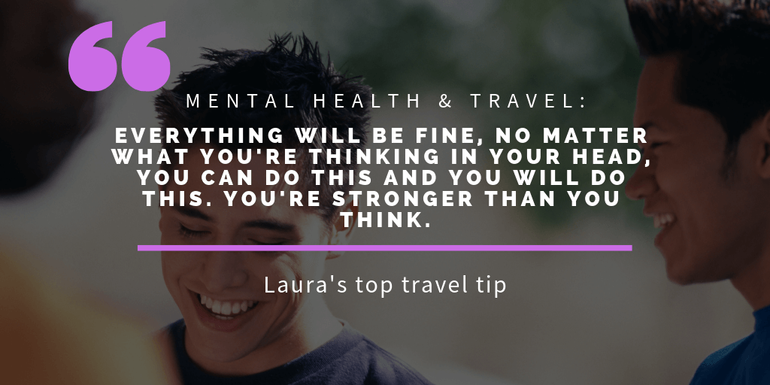
Why is Mental Health so important today?
Mental Health awareness has been gradually increasing over the last couple of years, thanks to various initiatives throughout the UK. The Heads Together campaign caught our eye in particular when we saw that it is heavily supported by Neil Laybourn and Jonny Benjamin, two of the UK’s biggest mental health campaigners following on from their Stranger on the Bridge story.
They both tour the UK to run various workshops and talks about all things mental health, so it’s safe to say they know a little about the impact travel can have on their mental health!
“Traveling can compound already existing and or underlying issues of those who are suffering with their mental health. It is important for travel companies to understand this and to know the reasons as to why this could happen – then provisions can be made” – Neil Laybourn
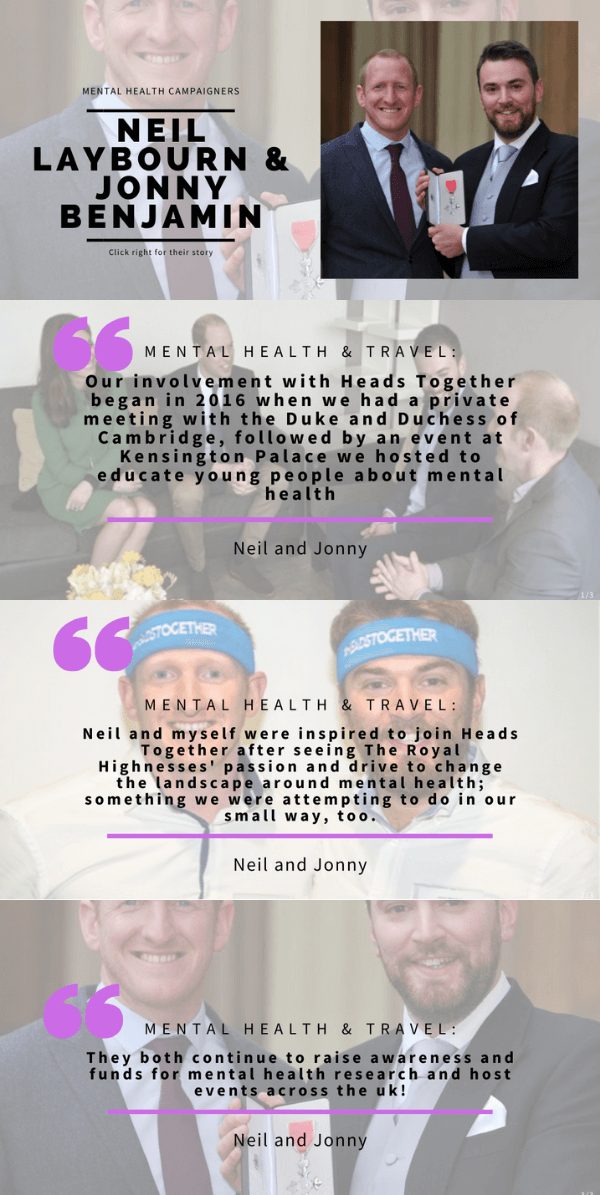
Mental health forms part of everything we do. If conditions get so bad it means people don’t feel they can travel, what kind of life is that? We don’t just mean not being able to jet off to a tropical climate, but seemingly simple journies like getting on the train or bus; if we don’t have an understanding of why this may be difficult or upsetting for some, how can we support them?